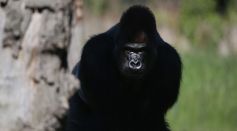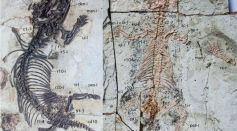ENVIRONMENT & CLIMATE
Amorous Alligators in Florida Now More Active and Visible As Mating Season Begins
Parasites Face Extinction; Study Tells Us Why We Need to Save Them

Baby Alpaca Gets Wheelchair as Gift to Walk Again

Climate Change: Few Degrees of Warming Could Collapse Antarctica's Ice Shelves

Indonesia 6.0-Quake Attributed to “Ring of Fire,” Aftershocks Expected
St. Vincent Volcano Eruption Looms, Caribbean's Deadly Historic Blasts Serves as Warning for Immediate Evacuation

Cat's Primordial Belly Pouches-- What is it For?

‘Godzilla’ 6-Foot Monitor Lizard Invades 7/11 Convenience Store in Thailand
Dead Whales Washed Up in Sea: Four in San Francisco Bay, Two More in Bangladesh

3,000-Year-Old Lost Golden City: Egypt's Biggest Discovery Since King Tutankhamun's Tomb
Neural Network From Brain to Eyes Evolves Much Earlier, Fish Genetics Study Shows

Silverback Gorillas Beat Their Chests to Communicate, Shows How Big They Are

Scientists Unearth Fossils of Ancient Burrowing Mammal-Like Animals

Europe's Oldest Map Carved in Forgotten Stone Slab Rediscovered in France
Most Popular

Why Earthquakes Strike Without Warning — and How Modern Science Is Working to Predict Them

UFOs vs UAPs: What's the Difference and Why Scientists Care

How Climate and Space Weather Collide: Surprising Ways the Solar Influence Earth Is Changing

Will Private Companies Drive the Next Era of Space Exploration and Commercial Expansion?





